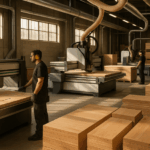This industry manufactures large, complex finished goods such as capital equipment & industrial products like construction equipment, agricultural machinery, power generation units, and heating/cooling equipment. It can also encompass a broad range of manufactured sub-assemblies such as engines, pumps, gearboxes, control units, and hydraulic assemblies. Manufacturers in this space face a variety of challenges as the business environment evolves.
- Increasingly complex supply chains. Manufacturers are becoming less vertically integrated as globalization progresses. Components and sub-assemblies that used to be manufactured “in-house” are now being sourced from outside suppliers, often located overseas. At the same time, “lean” initiatives put pressure on inventories of these critical components, which means that supply chain visibility and execution become key to delivering finished goods to the customer.
- Demand for customization. Customers of this industry demand increasing flexibility in terms of the product they order. Where the rule used to be “any color as long as it is black”, manufacturers are now forced to offer a wide variety of features and options that affect not just the color, but also the fundamental engineering of the product. As this progresses, the ability to simply build finished goods “to stock” is reduced.
- Service parts fulfillment. Complex machines can have complex service requirements. In the capital equipment industry, customer machine downtime can translate not only into customer dissatisfaction but can even translate into concrete penalties.
To enable customization in a mixed-mode manufacturing environment, Frontier’s configured ERP software supplies powerful product configuration capabilities coupled with robust discrete manufacturing functionality to support the entire order-to-cash, plan-procure-pay cycle.
Contact us today and learn more about Frontier ERP with built-in MES, CPQ, PCM, Financials, and more.



